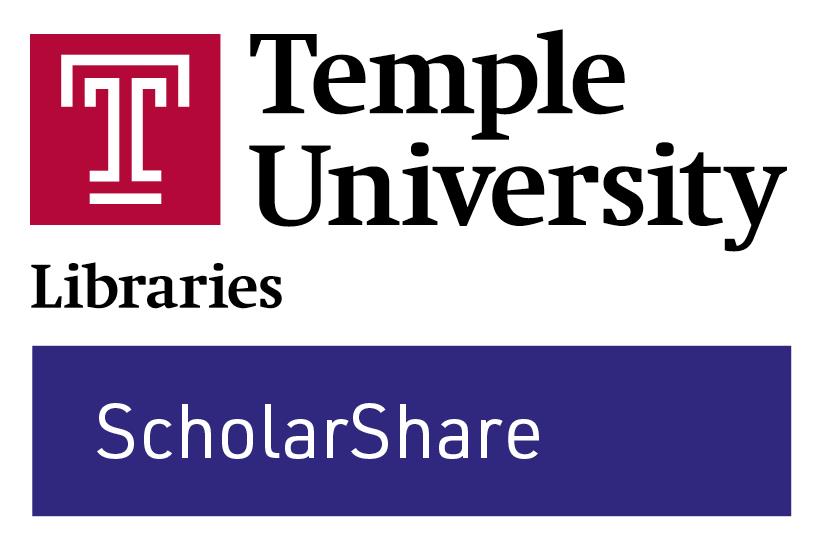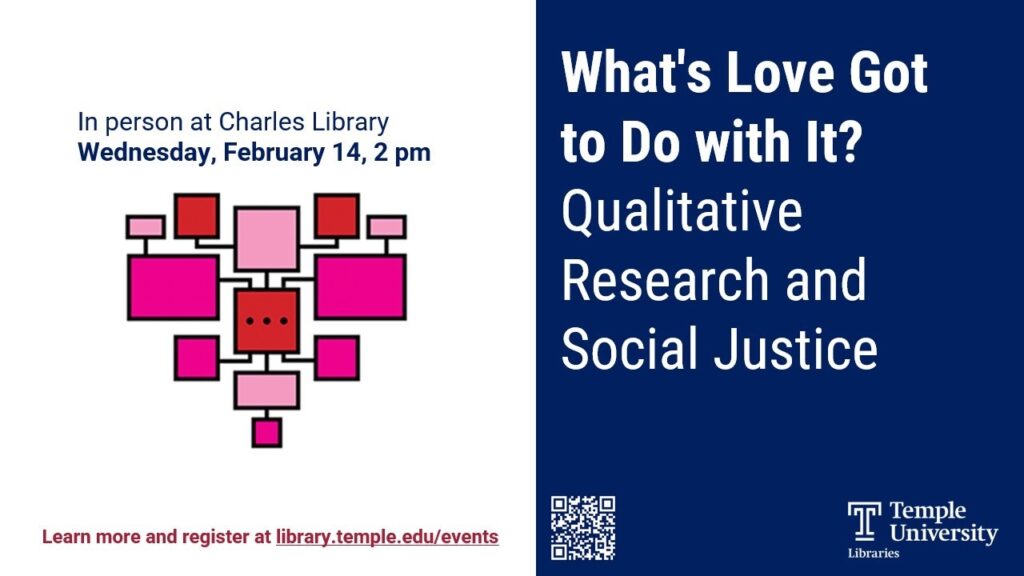Guest post by Will Dean, Research and Data Services Librarian
Chase away the winter doldrums with data! Join Temple University Libraries for a week of educational and useful workshops and events. Our Research Data Services team is proud to present a week of virtual workshops and events that teach data skills as well as showcase the research and work of our academic community.
Speakers will present on the use of data journalism to empower readers and the role of love in social science research. We will also cover varied topics like statistical analysis, choosing a repository to deposit your data, 3-D printing topographical maps, ethically sharing qualitative research data, and free data tools. Programs are open to everyone, and most of the in-person events will have a remote option. More information can be found on the schedule below and on this guide: https://guides.temple.edu/lovedataweek.
Schedule of events:
Do you collect data in your research or classwork? This workshop will teach you about some of the data tools available to you at Temple. There are tools to help you with:
- writing a data management plan
- organizing your research project
- collecting your data
- analyzing your data
- sharing and preserving your data
Love Data Week: Empowering readers through data journalism
Tuesday, Feb. 13, 2024, 10:00 am
Charles Library first floor event space, 1900 N. 13th Street
Colin Evans, the data editor at Temple University’s Logan Center for Urban Investigative Reporting at the Klein College of Media and Communication, will speak about how data journalists collect, analyze, and visualize data, and how their findings provide tools for readers to advocate for their communities. Evans will also discuss his work with students at the Logan Center and how data plays a role in the center’s investigative reporting.
Colin Evans, KLN ’21, came back to Klein in 2023 to mentor students working for the Logan Center and assist in its investigatory journalism. His work has ranged from reporting on schools to gun violence to homelessness, with bylines in The Philadelphia Inquirer, Billy Penn, and WHYY. He previously worked as the data reporter at LancasterOnline. In-person event registration is encouraged but not required. This event will also be streamed via Zoom. Please register to receive a link to attend remotely.
Love Data Week: Choosing a Repository for your Data
Tuesday, Feb. 13, 2024, 12:00 pm
Online event | Zoom
Researchers can make their research accessible and reproducible, and fulfill funder requirements, by depositing their research data in a repository. This workshop will explain the differences between different repository types and what repositories Temple Libraries belongs to. Instructors will provide a framework you can use to decide what repository to use to preserve and share your research data and take the headache out of finding a home for your research data.
Are you new to clinical research and want to know what kind of analysis you should perform in your research project? Need a refresher before you start analyzing your data? Join Dr. Daohai Yu of the Department of Biomedical Education and Data Science for a workshop covering the basic statistical skills you need for clinical research. No statistical experience is necessary, and this event is open to all skill levels.
Love Data Week Keynote Talk: What’s Love Got to Do with It? Qualitative Research and Social Justice
Wednesday, Feb. 14, 2024, 2:00 pm
Charles Library first floor event space, 1900 N. 13th Street
Most researchers learn from our earliest training about the importance of objectivity in our work. As scholars attempting to analyze the social justice movements of our time, however, we may also ask whether love may inform our research in meaningful ways. In this talk, Temple University Department of Criminal Justice Associate Professor and qualitative researcher Jamie Fader discusses the role of love (e.g., empathy, humanity, and connectedness) in qualitative social research and makes the case that both validity and equity can be served by drawing on love as a research tool.
From developing rapport with research participants through empathy and care, to drawing on personal experiences to analyze narratives, or employing epistemological or theoretical perspectives that privilege liberatory aims, Fader argues that love should be a component of our research toolkits. Moreover, as academic spaces become increasingly diverse, we may need to consider that our insistence on objectivity might have unintended exclusionary outcomes. To make the case for love, Fader draws on her own research on justice system-impacted Philadelphians.
Love Data Week: Ethically Sharing Qualitative Data
Thursday, Feb. 15, 2024, 12:30 pm
Online event | Zoom
In 2022, the US government announced upcoming stringent requirements for data sharing for all recipients of federal grants. The requirements have been in place for National Institutes of Health (NIH) grants since early 2023 and have just been announced by the National Science Foundation (NSF) for 2025. These new requirements pose challenges to qualitative research, where data has, in the past, rarely been shared. In this workshop, Associate Director of the Qualitative Data Repository (QDR) Sebastian Karcher, will discuss some of the ways to address ethical and logistical challenges of sharing qualitative research data. The workshop focuses on practical, hands-on strategies to facilitate both ethical research and data sharing spanning the entire course of research: research design, informed consent, documentation, and data publication.
Love Data Week: Terrain 3D Printing with QGIS
Friday, Feb. 16, 2024, 10:00 am
Charles Library, Room 202, 1900 N. 13th Street
Discover the exciting world of 3D printing for landscapes and terrains using Quantum GIS (QGIS) and Digital Elevation Models (DEMs) in this immersive workshop. Whether you’re a GIS enthusiast, environmental scientist, or a 3D printing enthusiast, this hands-on session is for you. Learn the basics of QGIS, manipulate DEMs, create stunning 3D models, prepare them for 3D printing, and witness your digital landscapes come to life. Gain practical insights, explore real-world applications, and troubleshoot common issues in a single session. Join us and unlock the potential of merging technology with geography to bring your ideas to life through 3D-printed landscapes and terrains.




